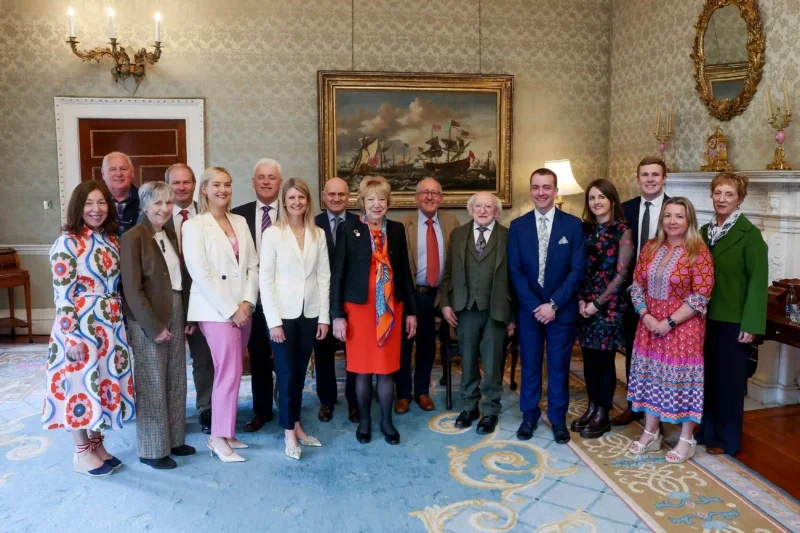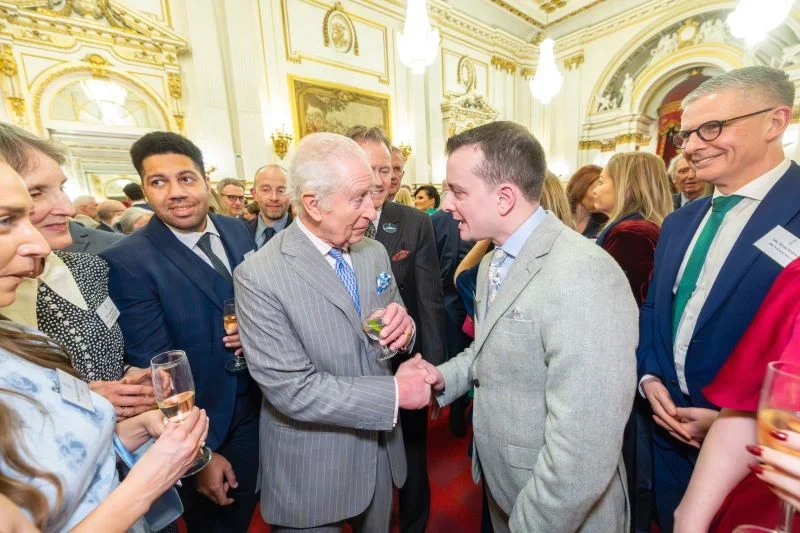
Northern Ireland’s The Impartial Reporter says its circulation revenue and digital subscriber numbers are both rising as the Newsquest title prepares to celebrate its 200th birthday.
The regional weekly, the third-oldest paper on the island of Ireland, covers the westernmost constituency in the UK as well as surrounding communities over the border in the Republic of Ireland.
Rodney Edwards, The Impartial Reporter’s 39-year-old editor, told Press Gazette he had “always been optimistic about the paper, because there’s such a great loyalty here with readers”.
Edwards first wrote for the Fermanagh paper when he was 16 and has spent almost his entire journalistic career there except for three years at the Sunday Independent.
He returned to The Impartial Reporter as editor in 2023 and said his first priority had been to “revamp” it, adding sections for business, arts and culture, opinion and “people and places” within the first six weeks.
The latter created a home for “lovely features on history and heritage” as well as more space for photography, which Edwards said he had made a key part of The Impartial Reporter.
“We cleared pages to make pictures bigger, we got rid of some front page ads so that we’d have more impact on the front page. I really, really pushed photography,” he said, including drone imagery. “We live in such a beautiful place in County Fermanagh, which is surrounded by water. And I wanted to see more of the beautiful lakes from the sky.”
He brought on columnists including republican social justice campaigner Bernadette McAliskey, former DUP First Minister Arlene Foster and prominent priest and broadcaster Father Brian D’Arcy, wanting “to make sure that we had really diverse opinions”.
Edwards said he also pushed “a real focus on community and social justice type issues” alongside room for more longform journalism, which had yielded pieces on childcare costs, local dog breeding establishments and tuberculosis in farming.
The title’s eight journalists (including Edwards) include one BBC-funded Local Democracy Reporter – soon to be joined by a second – and they are supported by Newsquest’s “AI-assisted” reporters who use the technology to quickly rewrite supplied copy into a story.
“It clears the decks for the reporters,” Edwards said. “We then find that the reporters have more time to focus on the original journalism and the investigations or the longform articles.”
Edwards said before he came back as editor “I wasn’t convinced how AI was going to help journalism.
“But now I see the benefits of it – I see there’s some drawbacks as well, of course, but mostly I see the benefits, because it’s actually assisting in so many ways.”
Slowing print decline, growing digital subscribers
In the most recent regional newspaper ABCs The Impartial Reporter had an average circulation per issue of 6,097 in 2024, a figure that was down 2.4% compared to the year before. This was a notably smaller fall than the median rate of year-on-year change among all weekly papers publicly audited by ABC, which was a 16.5% decline.
But in March the paper launched a new edition covering the neighbouring area of South Tyrone, which Edwards said had led to a 4% year-on-year increase to The Impartial Reporter’s circulation revenue, and it added 500 digital subscribers last year, which he said had doubled the total. Newsquest passed 100,000 digital subscribers across its titles in September. Following the South Tyrone launch the paper’s year-on-year print volume decline currently stands at 1.2%.
“I suppose what we’re seeing is a real appetite for that type of journalism,” Edwards said.
He paid tribute to his three predecessors as editor, Denzil McDaniel, Sarah Saunderson and Mark Conway – all of whom had been his boss – and added: “I have to point out just how much I appreciate the support I’ve been getting from Newsquest…
“They’ve been really, really supportive. They have agreed to a lot of my ideas, and I think there’s a bit of an ongoing joke that I might be a little bit unpredictable at times, which I quite like. You have to keep people guessing.”
Editorial director Toby Granville and chief executive Henry Faure Walker had been “very supportive of us changing the paper” and the new edition, he said. “There aren’t too many newspaper companies that are willing to take that chance to launch something new in this climate, and I have to really pay a tribute to them.”
The Impartial Reporter’s 200th birthday is on 19 May and will be marked by an exhibition at the local museum, a special broadsheet supplement on Thursday 22nd under the original 1825 masthead and a book featuring interviews with staff from the paper going back as far as the Sixties.
The book will carry a foreword by Irish president Michael Higgins, who last month hosted the paper’s staff for tea – weeks after Edwards was welcomed to a reception for regional media by King Charles.
“It is lovely that people like the King and the president are behind a paper like ours,” he said, although he added they were most keen “to have support locally”.


First founded by printer John Gregsten, The Impartial Reporter was ultimately acquired by its original editor William Trimble, whose descendants owned, edited and managed the paper until 2006 when it was sold to Ulster News Group. That group’s titles were acquired by Newsquest in 2015.
Edwards said when he became editor the Trimbles gifted him a copy of The Impartial Reporter’s “manifesto” published before the first edition which vowed to hold the powerful to account – at that time meaning standing up to local landlords on behalf of tenant farmers.
The title has historically been considered unionist, although Trimble asserted in his first editorial: “Regardless alike of the frowns of party, and the smiles of power, we shall state our own convictions on all subjects which come under review. We shall defend the Protestant when we consider him in the right, and the Roman Catholic may expect similar treatment.”
Arguably the paper’s biggest ever scoop came in 1916 when it is believed to have published the first eyewitness account of the Easter Rising, which prefaced Ireland’s eventual declaration of independence in 1919.
The newspaper was a finalist for the British Journalism Award for local journalism in 2019 for Edwards’ 18-month investigation into sexual abuse in Fermanagh, which he said “let to prosecutions and real change”.
He said: “As long as you’ve got a team of journalists who are hungry to do that [kind of journalism], then they’ll always come up with the results, and it appears that companies like Newsquest are willing to invest if it’s there. And I believe it’s there. So that’s why, I suppose, I’m quite optimistic.”
Email pged@pressgazette.co.uk to point out mistakes, provide story tips or send in a letter for publication on our "Letters Page" blog

